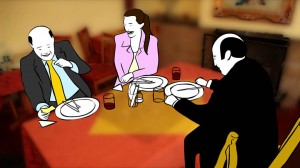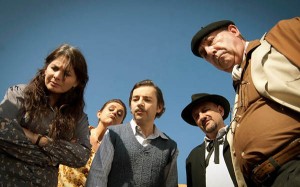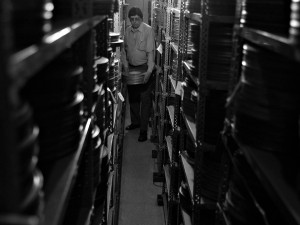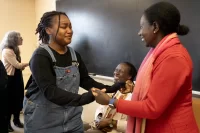
‘Memories of Present Past’ film series fetes new Latin American studies program
Celebrating the introduction of its Program in Latin American Studies, Bates presents a festival of independent films set in Latin America in screenings Friday through Sunday, Oct. 11-13, in Room 104 of the Olin Arts Center, 75 Russell St.
Titled Memories of the Present Past/Memorias del Pasado Presente, the series opens at 7 p.m. Friday, Oct. 11, with The Invisible Eye, an exploration of surveillance, repression and insurrection during the military regime in Argentina.

A scene from “Fat, Bald, Short Man,” a 2011 production in rotoscope by Colombian director Carlos Osuna.
Showing on Saturday, Oct. 12, are Fat, Bald, Short Man at 3 p.m. and The Prize at 7. Sunday’s films are The Finger at 3 p.m. and A Useful Life at 7. (Descriptions appear below.)
Admission is open to the public at no cost. The series is presented by the Latin American studies program, the Bates College Museum of Art and the college’s George and Helen Ladd Library. For more information, please call 207-786-8212.
These five critically acclaimed films reflect on the contested memories of the past, the reverberations of state repression in everyday life and the restoration of democracy in the region.
They are drawn from the Global Lens series of international films. Created by the Global Film Initiative and regularly featured at Bates, Global Lens celebrates the artistry of independent and emerging filmmakers in countries outside the film industry mainstream.
Formalizing the college’s longstanding interest in Latin America, the new program enables Bates to offer, for the first time, a formal major in the field. Geographically, the program encompasses Mexico, Central America, South America and the Caribbean. Course offerings cover anthropology, economics, environmental studies, history, politics and Spanish.
“You can’t understand the United States without understanding Latin America, and you cannot understand Latin America without understanding the United States,” says film series co-coordinator Jennifer Adair, visiting assistant professor of history. A specialist in Latin American history, Adair organized Memories of the Present Past with Baltasar Fra-Molinero, professor of Spanish and of African American studies, and with staff at the art museum.
Politically, socially, economically and culturally, the Americas are connected in ways both apparent and subtle, Adair says. “Understanding what unites the Americas is really resonant today, so it’s timely that Bates can now integrate these different aspects of what it is to be American — meaning North, Central and South America.”
The film series has its own timeliness. 2013 is the 40th anniversary of the military coup in Chile that overthrew the democratically elected government of Salvador Allende and epitomized a period of state terror throughout Latin America. This year also marks the 30th anniversary of democracy’s return to Argentina after a military dictatorship notorious for its brutally repressive tactics.
Those events shape the stories and characters in this film series. And film, in turn, is a uniquely effective medium for these stories.
Film, says Fra-Molinero, is “a showcase of the diversity of cultural, political and artistic experiences of Latin America.” And Latin American film is an up-and-coming force in the film world. “Film is such a strong cultural product,” he says.
These filmmakers, Adair says, are “children of the dictatorships.”
“Each film in the series is in direct conversation with some aspect of the recent past, and speaks to the ways that memory has somehow become part of politics today.”
In that sense, says Fra-Molinero, the films offer valuable lessons for Bates students coming to grips with pivotal moments in the recent history of their own country that took place when they were very young, such as the terrorist attacks on Sept. 11.
Here are the films of Memories of the Present Past/Memorias del Pasado Presente:
- The Invisible Eye (La Miranda Invisible; Argentina, 2010. 95 min.). Director Diego Lerman tells the story of a lonely and obedient teacher at an elite Buenos Aires school. At first adopting the school’s totalitarian oversight policies, she soon finds herself amidst a breakdown in structure and discipline at the school that mirrors the rebellion outside.
- Fat, Bald, Short Man (Gordo, Calvo y Bajito; Colombia, 2011. 91 min.). In this film by Carlos Osuna, the prospects for a lonely middle-aged notary unexpectedly change after he joins a self-improvement group and his charismatic new boss — and strangely affable doppelgänger — takes an interest in his life. Filmed in rotoscope.
- The Prize (El Premio; Argentina, 2011. 99 min.) A political activist’s life-in-hiding on an isolated stretch of Argentina’s coast is jeopardized after her 7-year-old daughter is selected to participate in a local school’s patriotic essay contest. Directed by Paula Markovitch.
- The Finger (El Dedo; Argentina, 2011. 93 min.) In the face of electoral fraud and intimidation, the severed finger of a respected local leader points the way forward for independent-minded citizens and their town’s quest for democracy. Directed by Sergio Teubal.
- A Useful Life (La Vida Util; Spanish, 2010. 63 min.) In director Federico Veiroj’s story, a cinema in Uruguay closes due to dwindling support, forcing loyal employee Jorge to find a new passion and navigate his world beyond the screen.








